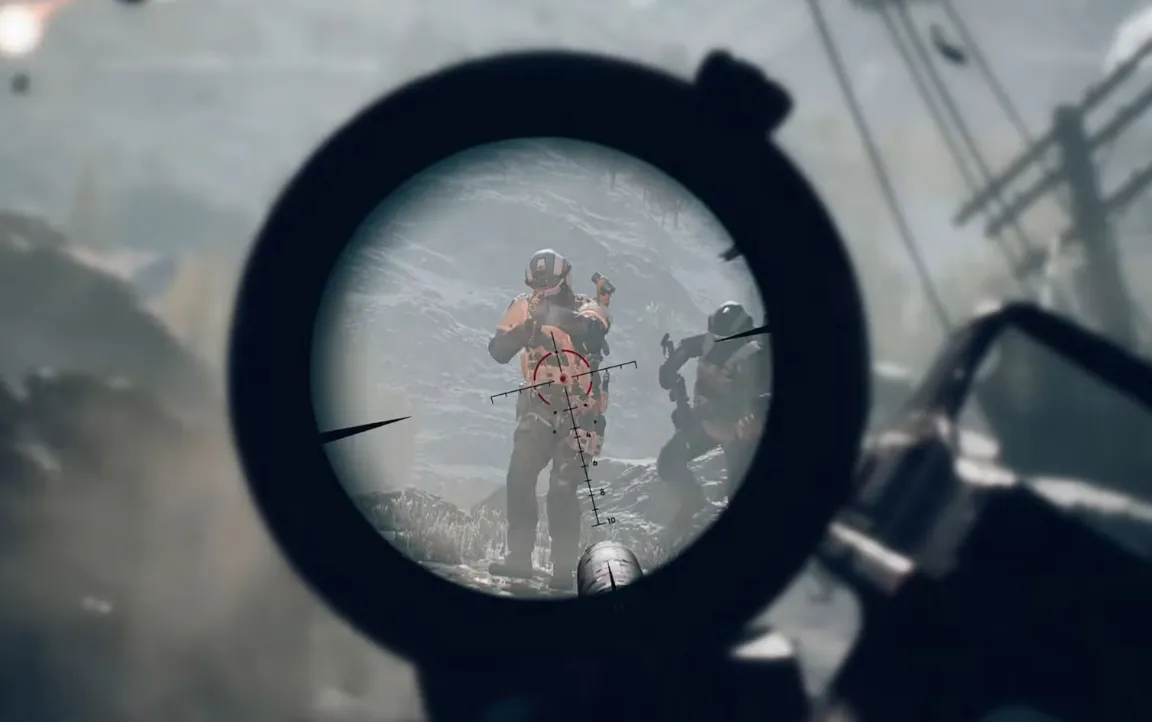Battlefield 6 separates controls into schemes for on-foot play and vehicles, so changing the button layout is a two-step process: pick a preset, then (optionally) remap any single action. The menus are the same on PS5, Xbox, and when using a controller on PC.
- From the main menu, open
Settings(cog icon) and selectController.
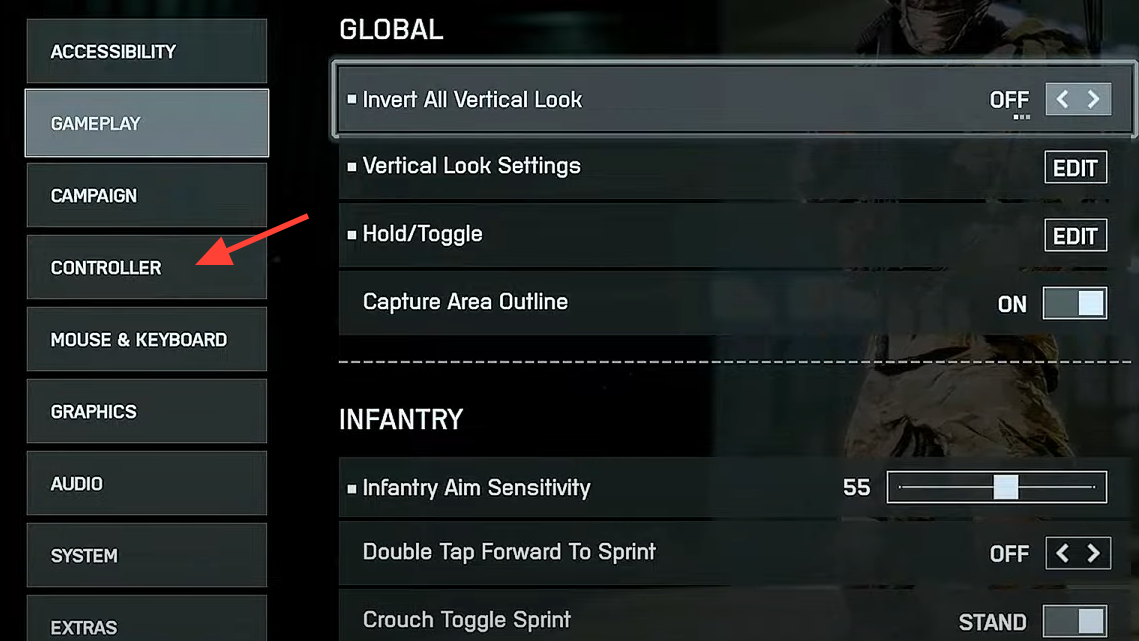
- Choose
Edit Presetsto see the six controller schemes and their button maps. - Highlight a scheme (for example,
Soldierfor on-foot) and setButtonsto your preferred preset.
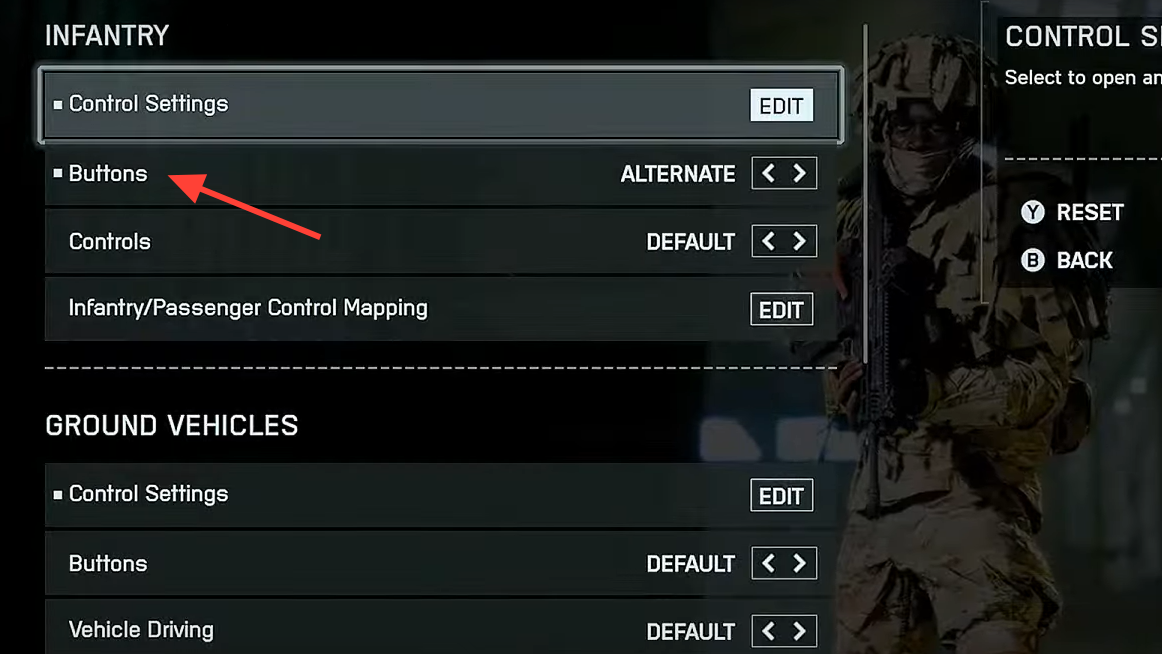
- Repeat for other schemes you use (
Ground Vehicles,Aircraft, etc.). - Press
Applyor confirm when prompted.
Choose a preset per scheme (Soldier, Vehicles, Aircraft)
For most players, switching the Buttons preset to Alternate is the quickest upgrade. On foot, it puts frequent actions under your thumb without moving it off the sticks, and in vehicles, it shifts turning to a more intuitive input.
| Scheme | Recommended Buttons preset | What changes with Alternate |
|---|---|---|
| Soldier (on-foot) | Alternate | Melee moves to B/Circle; Crouch/Prone moves to right stick click. |
| Ground Vehicles | Alternate | Left stick becomes turn/yaw left–right instead of forward–back. |
| Aircraft | Alternate | Left stick becomes turn/yaw left–right for smoother directional control. |
| Other schemes | Alternate (optional) | Less critical; apply if it feels better for you. |
If you prefer the default on-foot layout, consider keeping Alternate for vehicles and aircraft only. The yaw-on-stick change tends to make aircraft and ground vehicles easier to handle.
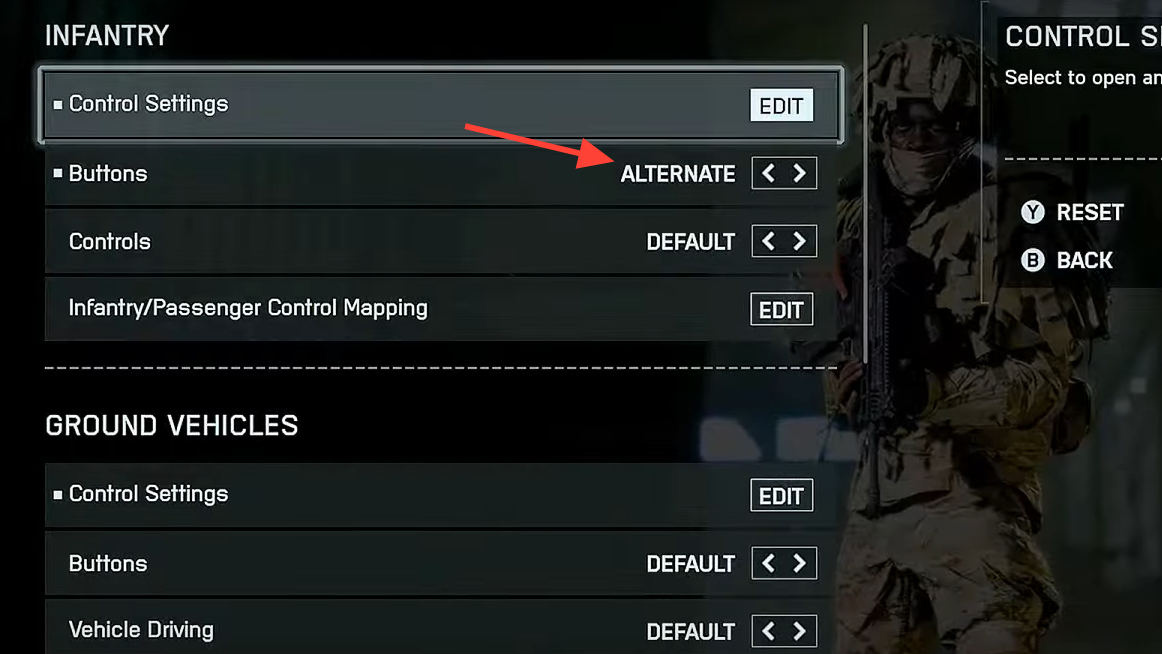
Customize individual bindings (Edit Keybinds)
If a preset gets you close but not perfect, you can remap a single action without rebuilding the whole layout.
- In
Settings > Controller > Edit Presets, highlight a scheme. - Select
Edit Keybindsfor that scheme. - Pick an action (for example,
MeleeorCrouch/Prone) and assign the exact button you want. - Confirm and repeat for other actions as needed.
Each scheme stores its own bindings, so you can keep a tactical on-foot layout while using a different map behind the wheel or in the cockpit.
Optional: dial in on-foot control settings
Once your buttons are set, a few core sensitivity and zoom values can make aiming feel consistent across weapons and magnifications. These values are widely used baselines you can adjust to taste.
| Category | Setting | Baseline value | Notes |
|---|---|---|---|
| Aim | Infantry Aim Sensitivity | 30–40 | Start low; raise in small steps if turn speed feels sluggish. |
| Aim | Zoom Sensitivity Coefficient | 177.8 | Keeps scoped aiming proportional to hip-fire speed. |
| Aim | Infantry Aim Assist | 100 | Full strength aim assist; lower only if you prefer more manual control. |
| Aim | Slowdown / Zoom Snap | Slowdown 100, Zoom Snap 50 | Strong slowdown with moderate snap works well for most players. |
| Aim | Soldier Aim Input Curve | Standard | Use a legacy curve only if you’re matching a previous Battlefield feel. |
| Aim | Aiming Left/Right Acceleration | 60 | Adds speed when holding the stick; lower for steadier micro-aim. |
| View | Field of View | 105–110 | Wider view reduces perceived recoil; very high FOV can shrink targets. |
| Zoom | Infantry Zoom Aim Sensitivity | 80 | Adjust to keep ADS tracking comfortable across optics. |
| Zoom | 1.25x Zoom Aim Sensitivity | 80 | Use as a starting point; tune per optic if needed. |
| Movement | Infantry Sprint | Click | Stick click sprint is familiar and keeps thumbs on the sticks. |
| Interaction | Interact & Reload | Prioritize Interact | Reduces missed revives or door interactions near ammo. |
These are in Settings > Controller > Edit Settings > Infantry > Control Settings.
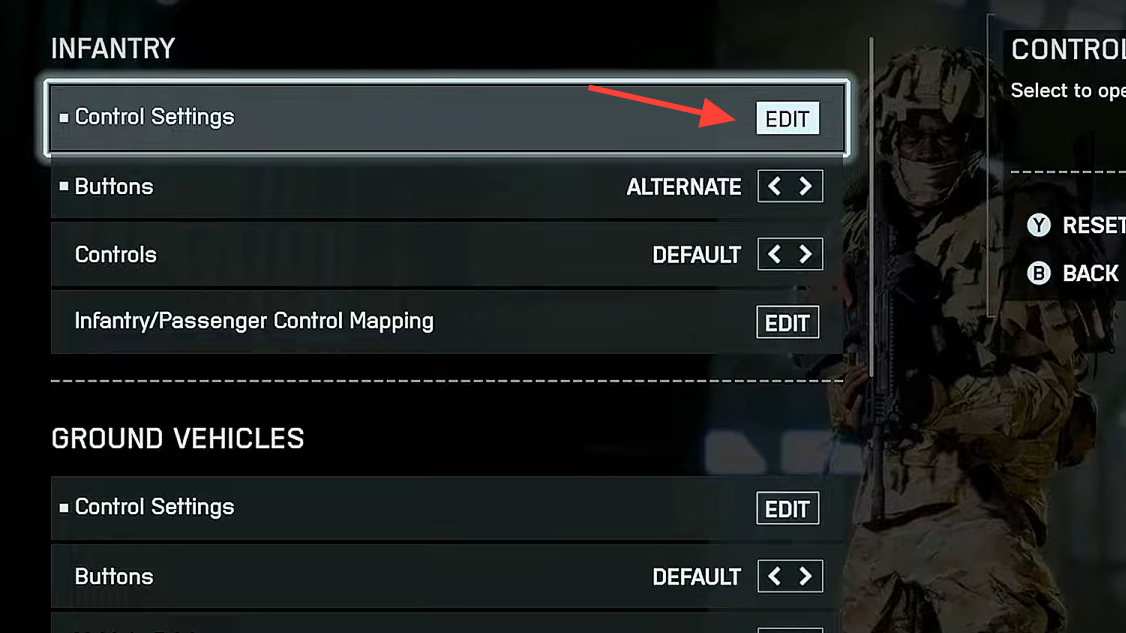
Optional: tighten controller deadzones
Fine-tuning deadzones can eliminate drift and improve small stick movements. Start low and raise slightly if you notice drift or unintentional input.
| Control | Setting | Baseline value | When to change |
|---|---|---|---|
| Vibration | Vibration | Off | Turn on only if you prefer haptics over stability while aiming. |
| Left Stick | Center Deadzone | 5 | Increase gradually if the camera or vehicle creeps on its own. |
| Left Stick | Axial Deadzone | 10 | Raise if diagonal inputs feel inconsistent. |
| Left Stick | Max Input Threshold | 80 | Lower if you want full speed with less stick travel. |
| Right Stick | Center Deadzone | 5 | Bump up slightly if the reticle drifts without input. |
| Right Stick | Axial Deadzone | 10 | Raise to stabilize diagonal aim if needed. |
| Right Stick | Max Input Threshold | 100 | Keep at 100 for full-range precision. |
| Triggers | LT/RT Deadzone | 0 | Increase only if hair-trigger inputs happen by accident. |
| Triggers | LT/RT Max Input Threshold | 100 | Leave at 100 for consistent pull detection. |
Find these in Settings > Controller > Edit Settings > Other > Controller Tuning. If you don’t use gyro or flick stick features, you can leave those options alone.
If your layout changes aren’t showing up
- Confirm you edited the correct scheme (on-foot vs. a vehicle type).
- Make sure
Buttonsis set on the scheme you’re actively playing. - Check
Edit Keybindsto ensure a manual remap isn’t overriding your preset.
Set the Alternate preset where it helps most, then tailor a few keybinds to match muscle memory. With per-scheme layouts and a quick pass through sensitivity and deadzones, Battlefield 6 feels consistent whether you’re on foot, in a tank, or in the air.

